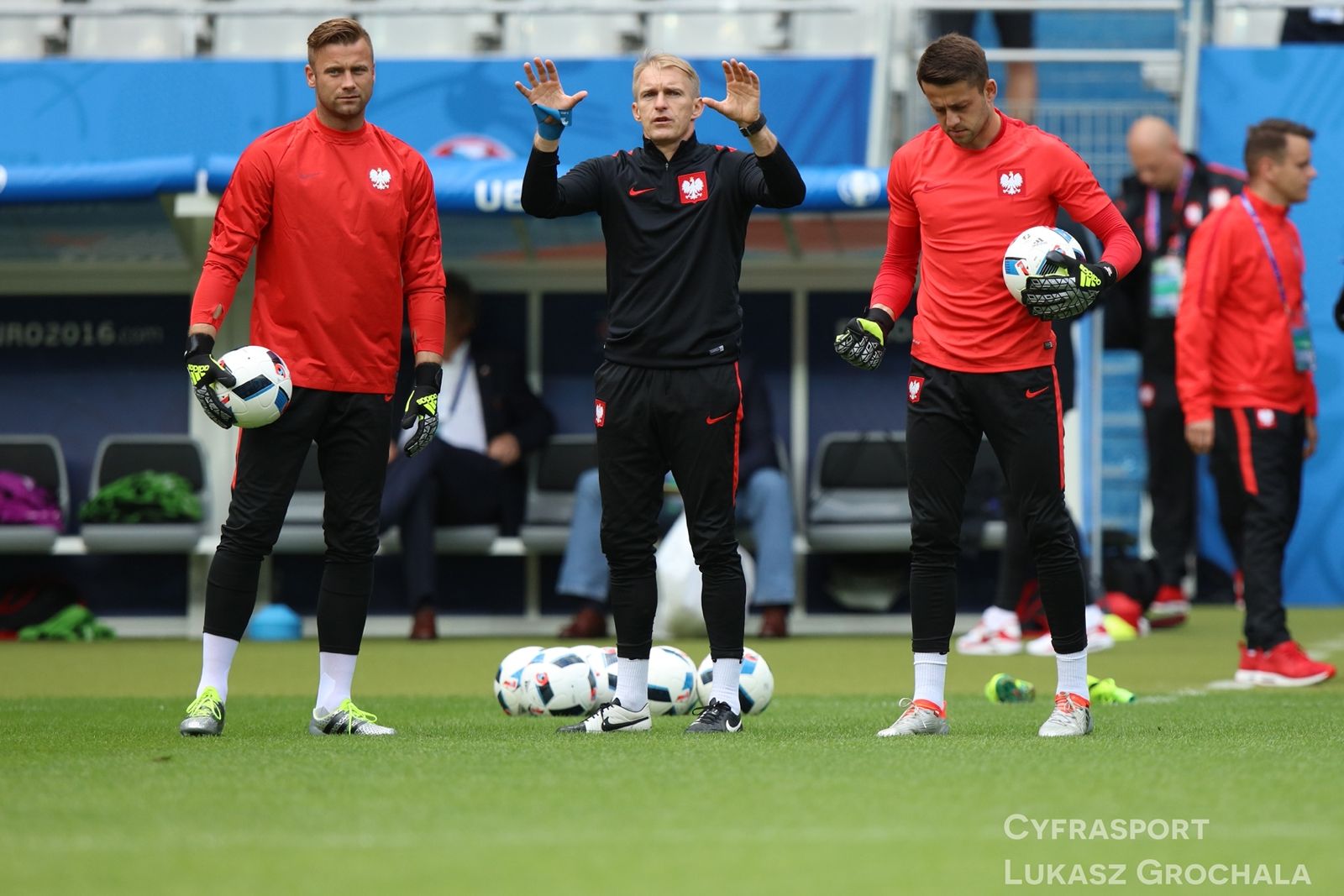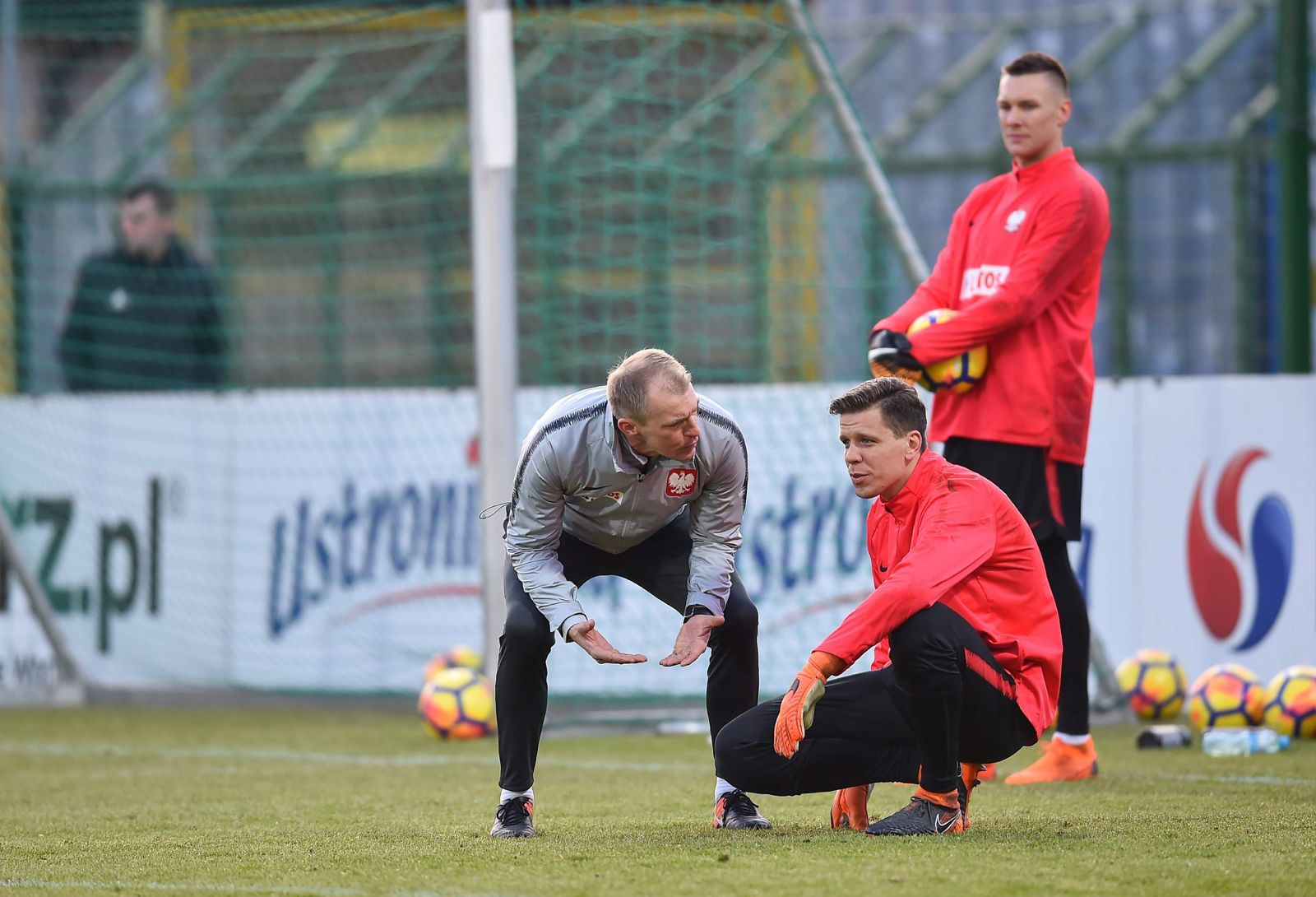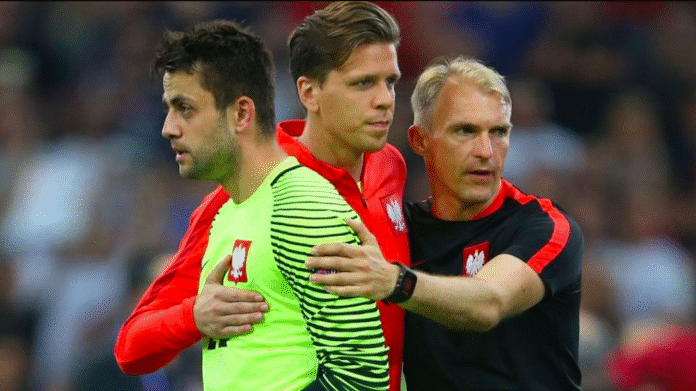Poland’s Goalkeeping Architect
Jarosław Tkocz, born 25th of February 1973, is a UEFA A license Goalkeeping Coach, whose name is synonymous with Polish goalkeeping excellence. From being named Ekstraklasa’s Goalkeeper of the year 2003 to his role as Goalkeeping Coach for Poland’s national team (2013–2018) and top-flight Polish clubs, Tkocz has shaped elite goalkeepers and contributed to historic achievements.
Poland National Team
Tkocz’s time with the Polish national team was a defining chapter in his career. With limited on-field training, he relied on video analysis, tactical briefings, and club-based routines, while emphasizing mental preparation and team cohesion.
“Working with the national team brings a different pressure compared to club football… On-field sessions focused on implementing these strategies.”
During this period, Poland reached 5th in the FIFA World Ranking in 2017, qualified for Euro 2016, and competed at the 2018 World Cup.
Working with goalkeepers like Boruc, Szczęsny, Fabiański, and Skorupski, Tkocz tailored his methods to each player, fostering trust and professionalism. With limited time for direct training, Tkocz adapted to club-based routines while emphasizing mental preparation and team cohesion. Among his proudest moments were Euro 2016 qualification and the 2018 World Cup.

“The moment of greatest pride was qualifying for the European Championship in France 2016… people in roadside cafes and restaurants would stand up and applaud as we drove by in the bus with ‘Poland’ written on it.”
From Player to Coach
Tkocz’s journey to becoming a top coach was forged in the Polish Ekstraklasa and the Russian Premier League, where he carved out a reputation as a reliable goalkeeper. In 2003, he was recognized as the Best Goalkeeper in the Polish top division, a reward for his consistency and determination.
“In my case, it was determination, perseverance, and the fantastic team… I was determined to repay the trust of my coaches and give my all on the pitch.”
His playing career ended prematurely due to injuries, but coaching had always been on the horizon.
“Even when I was an active player, I took notes, analyzed training sessions, and thought about how to improve myself.”
Throughout his career, Tkocz credits the guidance and example of influential coaches for shaping both his playing and coaching philosophy. He reflects on how these experiences fueled his development:
“Those who gave me opportunities helped build my confidence, while those who didn’t believe in me only fueled my determination to prove them wrong.”
Among the key figures in his coaching journey are Adam Nawałka, the former Poland national team manager, and Marco Savorani, Italy’s national team goalkeeper coach.

Mentorship and Success at Club Level
Tkocz has consistently translated his philosophy into tangible results at the club level, combining technical expertise with individualized mentorship. At Raków Częstochowa (1st tier Poland), he played a pivotal role in shaping Vladan Kovacevic into one of Poland’s top goalkeepers.
“Vladan joined us with several deficiencies, but he was extremely receptive and determined. I’m thrilled that he trusted me and the club’s staff.”
Under his guidance, Kovacevic not only won the Best Goalkeeper Award 2022 but also contributed to Raków’s Polish Cup and Super Cup victories and a second-place finish in the league. Tkocz emphasizes that goalkeeper development cannot be separated from team dynamics:
“The team as a whole had a strong hunger for success, which ultimately translated into our results. Our head coach, Marek Papszun, skillfully capitalized on these circumstances and led the team to achieve success.”
Developing Polish Goalkeepers
Tkocz has long been an advocate for structured, individualized goalkeeper development. His own experience in the Polish system shaped this philosophy.
“Polish youth excel in athleticism and gymnastics… Early specialization, working with dedicated goalkeeper coaches develops technical skills and mental resilience.”
“My passion is developing goalkeepers and elevating them to the next level as quickly as possible.”
Club Experience Meets International Insight
Tkocz’s exposure to clubs across Europe enriched his approach. Collaborations with Juventus, Roma, Empoli, Fiorentina, Swansea, Bournemouth, and Bayer Leverkusen allowed him to observe best practices and integrate them into his coaching.
“My experiences in Italy significantly shaped my philosophy… one key takeaway was the use of guiding principles to enable goalkeepers to anticipate and react to specific game situations.”
He emphasizes that a goalkeeper’s development extends beyond technique. Mental preparation, confidence, and tactical understanding are equally critical.
“A goalkeeper’s mental state is crucial. We focus on building confidence during every training session, as well as after them.”

A Lasting Influence
From Ekstraklasa recognition to international tournaments, Tkocz has lived every side of the goalkeeper’s journey. His philosophy remains consistent: technical precision, tactical awareness, and above all, mental resilience.
“My passion is developing goalkeepers and elevating them to the next level as quickly as possible. Currently, I’m open to new challenges and projects.”
As Poland continues to produce world-class goalkeepers, Tkocz’s influence is clear — a mentor whose work has strengthened Poland’s proud goalkeeping tradition and inspired its future stars.
Our Exclusive Interview with Jarosław Tkocz
After your playing career in the top flight in Poland and Russia, what motivated you to transition into goalkeeping coaching?
Injuries forced me to end my professional playing career at the age of 33. I have always known that coaching is my calling and a way of life. Even when I was an active player, I took notes, analyzed training sessions, and thought about how to improve myself.
You’ve coached in Poland, Russia, Saudi Arabia, and on the international stage. How has your goalkeeping philosophy evolved through these diverse experiences?
Working with the Polish national team gave me the opportunity to visit various clubs where Polish goalkeepers were playing. Observing the work of coaches in these clubs significantly developed my coaching philosophy. I’ve had the chance to collaborate with clubs like Roma, Juventus, Empoli, Fiorentina, Spal, Bologna, Swansea, Bournemouth, and Bayer Leverkusen, among others. My goalkeeping philosophy has evolved considerably after working with the Polish national team, where I was able to implement my ideas in clubs later on. In a club environment where work is systematic and planned, we have a significant impact on the development of our goalkeepers. My experience and consistent work have allowed me to develop a large number of goalkeepers in a short period of time.
You are a coach who is constantly learning from different systems. What did you learn from your past club exchanges with teams in Italy (Juventus) and the UK (Swansea)?
My experiences in Italy significantly shaped my coaching philosophy, particularly in regards to goalkeeper development. I was impressed by the emphasis on work ethic, physical conditioning, defensive organization, and the synergy between goalkeepers and defenders. I also learned the importance of drilling technical and tactical skills, such as proper goalkeeper stance and movement patterns. One key takeaway was the use of guiding principles to enable goalkeepers to anticipate and react to specific game situations. Additionally, I observed effective coaching techniques employed by top coaches, which I believe are essential for goalkeeper development.
What was it like as a goalkeeper coming up through the Polish system?
The Polish goalkeeper development system provided a strong foundation for our players, thanks to a school system that prioritizes sports development. Polish youth excel in athleticism and gymnastics, which serves as a solid base for goalkeeper training. Notably, Polish goalkeepers benefit from early specialization, working with dedicated goalkeeper coaches and engaging in extensive individual training sessions. This bespoke approach, coupled with a strong gymnastic foundation, enables our goalkeepers to develop the necessary skills and physical attributes. Additionally, the mental resilience of our goalkeepers is well-developed, allowing them to perform under pressure and handle high-stress situations effectively.
What are the characteristics of a Polish goalkeeper?
Our goalkeepers possess excellent mental toughness, complemented by strong physical and athletic preparation. Their technical skills are well-developed, and their movement and agility have improved significantly over the past few years. We’ve also seen notable advancements in their ability to work in tandem with the defense. Moreover, our goalkeepers have made considerable progress in their distribution and involvement in offensive play, demonstrating a more well-rounded skillset.
How would you describe the Polish football league? Does the style of the league affect your preparation?
The Polish league is a good platform for goalkeeper development. In recent years, the youth development regulations have led to the emergence of several promising goalkeepers. Goalkeeper preparation should be comprehensive and holistic, regardless of the league they play in. Poland has certainly raised the bar in terms of physical conditioning for goalkeepers, with a greater emphasis now placed on the goalkeeper’s role in offensive play. However, it’s essential to remember that the primary responsibility of a goalkeeper is to defend the goal.
Working with the national team brings a different pressure compared to club football. How do you prepare goalkeepers for international competition?
Goalkeepers’ primary development occurs within their clubs, and when they join the national team, on-field training time is limited. Therefore, recovery and management of minor injuries that impact player comfort are essential. Our approach centered on video analysis and tactical briefings, utilizing meticulously prepared plans to convey our game model. On-field sessions focused on implementing these strategies. For individual goalkeeper training, we replicated their club-based methods, prioritizing familiarity and comfort in their preparation for international matches. Additionally, we invested considerable time in mental preparation and team bonding exercises, recognizing the importance of a cohesive unit.
Poland reached 5th in the FIFA World Ranking in 2017 while you were goalkeeping coach. What did it take behind the scenes to achieve that consistency?
The appointment of the first coach is pivotal in setting the tone for the team’s trajectory. Adam Nawałka’s appointment as head coach marked a turning point for the Polish national team, as he brought a clear vision, unwavering dedication, and a well-assembled coaching staff. His efforts to restore the prestige of playing for the national team paid dividends. Furthermore, the support and guidance provided by PZPN President Zbigniew Boniek, drawing on his extensive experience as a former national team player, were instrumental in the team’s success. Both Nawałka and Boniek can be credited as the masterminds behind the Polish national team’s achievements in 2017.
You worked with some of Poland’s greatest goalkeepers: Boruc, Szczęsny, Fabiański, Skorupski. How did you adapt your training methods to fit different personalities and styles?
Working with such personalities is a great pleasure; they’re true professionals. We had excellent relationships, and our training methods were based on their club activities. During training camps, where we spent more time together, we had the opportunity for intense work. The training methods were discussed beforehand, and there were no issues with acceptance from the goalkeepers.
What was your proudest moment with the national team? – What was the most valuable lesson you gained from that experience?
The moment of greatest pride was qualifying for the European Championship in France 2016. The entire tournament in France was an incredible experience. When we arrived at the stadium on match days, people in roadside cafes and restaurants would stand up and applaud as we drove by in the bus with ‘Poland’ written on it. A similar feeling of pride came when we qualified for the World Cup and participated in the tournament in Russia 2018. However, the biggest lesson I took away from my work with the national team came after leaving the federation. Football teaches humility, as for 1.5 years I didn’t have a job.
The Saudi league has been growing rapidly with major investments. From a goalkeeper coach’s perspective, what differences did you notice compared to European football?
The Arab league is very well-paid, and significant financial resources have become available. However, there are areas for improvement, such as infrastructure, medical care for players, and sports science support. Club owners hire high-quality coaches, but often don’t give them sufficient time to implement their work. The mentality of local players is also unique and requires a tailored approach. Additionally, religious and cultural differences play a significant role.
What was the biggest professional or cultural challenge you faced in Saudi Arabia, and how did you adapt to it?
Foreign players approach their duties with a high level of professionalism, whereas local players sometimes lack a bit of discipline. It’s essential to be flexible and find a balance. It’s challenging to enforce high standards from players who believe they’re performing perfectly. Personally, I encountered a significant disparity in the level of goalkeepers at the club I worked for. I had to design separate training sessions for certain goalkeepers and different ones for the others.
How much time do you focus on mental training for keepers?
A goalkeeper’s mental state is crucial. We focus on building confidence during every training session, as well as after them. Today, individualization of specific areas has led to clubs hiring dedicated sports psychologists. If a club doesn’t have one, players often work individually with a mental coach at their own expense. When collaboration with a sports psychologist isn’t possible, goalkeeper coaches take on this responsibility through conversations and relationships with goalkeepers.
What are the most difficult aspects of being a Goalkeeper that most people underestimate?
The most challenging moments for a goalkeeper are after a defeat where they’ve made a mistake. The criticism that follows on social media and online portals can be intense, and it’s crucial for the goalkeeper to receive support from their coach and the club during this time. When the spotlight is on them, they need people around them to help them cope with the pressure.”
What aspects of your own playing career do you share the most when coaching your goalkeepers?
Playing in the goalkeeper position certainly helps me understand my players. I know the challenges they face, their thought process during a match, and how to develop their skills. My experience enables me to quickly identify areas for improvement and focus on key aspects of their game. I can rapidly diagnose the deficits of the goalkeepers I work with.
What do you believe is the most important quality for a goalkeeper to succeed at both club and international level?
One of the most important characteristics of a goalkeeper is determination and a drive to succeed. A desire to develop and an open-minded approach to new solutions are essential. A key aspect is finding the right coach at the right time, someone who can develop and guide the goalkeeper to reach their full potential.
What advice would you give to young goalkeepers in Poland dreaming of reaching the national team or top European leagues?
Young goalkeepers should develop their athleticism comprehensively, with a strong emphasis on gym training and physical preparation. They should seek out coaches who can help them develop their skills and remain determined in their pursuit of excellence.
Looking forward, do you see your future primarily in club football or international football.. what do you see as your next step?
My passion is developing goalkeepers and elevating them to the next level as quickly as possible. I find working with a club brings me greater satisfaction, while working with a national team is a huge honor and prestige. Currently, I’m open to new challenges and projects.
“My passion is developing goalkeepers and elevating them to the next level as quickly as possible.”
Back to your playing career, what were the key aspects to your success in 2003 when you won Best Goalkeeper Award in the Polish Ekstraklasa?
In my case, it was determination, perseverance, and the fantastic team spirit that led us to secure third place in the Polish top league. I’m certain that the trust shown to me by my coaches had a significant impact on my performances. I was determined to repay that trust and give my all on the pitch.
Who were some of your mentors that helped shape your playing and coaching career?
Undoubtedly, the coaches I’ve encountered throughout my career have had a significant impact on my development. Those who gave me opportunities helped build my confidence, while those who didn’t believe in me only fueled my determination to prove them wrong. Key figures in my journey as a coach include Adam Nawałka (former Poland national team manager) and Marco Savorani (Italy national team goalkeeper coach and coach of several Italian clubs).
When Vladan Kovacevic won best GK award 2022, under your coaching at Rakow Czestochowa.. What were the reasons behind his success and the team’s success that year?
Vladan joined us with several deficiencies, but he was extremely receptive and determined. I’m thrilled that he trusted me and the club’s staff. The team as a whole had a strong hunger for success, which ultimately translated into our results. Our head coach, Marek Papszun, skillfully capitalized on these circumstances and led the team to achieve success.

